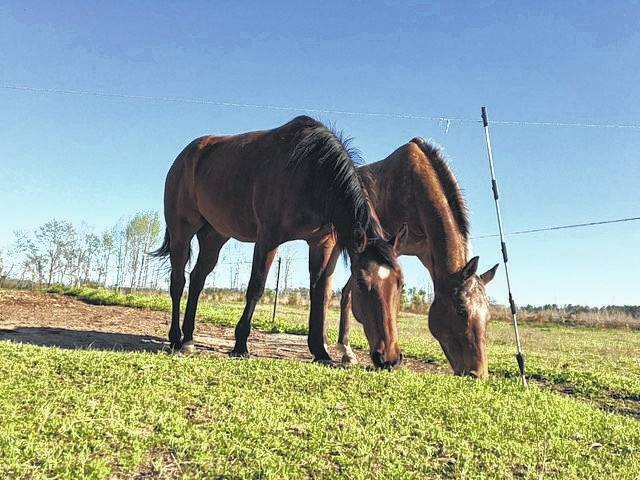Richmond County has had a pretty mild winter, which could increase the mosquito populations this summer. It’s important to not only protect yourself by using insect repellent, but also to protect your horses. There are several mosquito-born viruses that equines need to be vaccinated or boostered for, which makes these diseases easily preventable. Horses, donkeys, and mules need to be vaccinated against the West Nile Virus and Eastern Equine Encephalitis.
More than 15,000 horses have contracted West Nile since it was first detected in the United States in 1999. Approximately one-third of those horses diagnosed with the virus died or were euthanized.
Horses that are vaccinated and receive boosters at the designated intervals have the highest level of protection against the mosquito-born viruses. They should be vaccinated before the peak mosquito season and maintain scheduled boosters for consistent protection. The vaccine requires two doses, given two to four weeks apart. Full protection does not develop until four to six weeks after the second dose. It can take up to 10 weeks for a horse to be disease-resistant. Horse owners should talk with their veterinarians to determine the best time to start the vaccination process for EEE and West Nile virus.
There are combination products that horse owners can purchase to protect their animals from several diseases and conditions to get the most bang for their buck and to reduce the number of injection sites. Some combination vaccines protect against West Nile Virus, Eastern Encephalitis, and Tetanus. I encourage all horse owners to work with their veterinarian to find the best product and vaccination schedule for their animals.
Symptoms of WNV in horses can include loss of appetite, depression, fever, weakness or paralysis of hind limbs, convulsions, impaired vision or hyper-excitability. Symptoms of EEE, which is also known as “equine sleeping sickness,” include impaired vision, aimless wandering, head pressing, circling, inability to swallow, irregular staggering gait, paralysis, convulsions and death.
Humans, horses, and birds can become infected from a bite by a mosquito carrying the diseases, but there is no evidence that horses can transmit the virus to other horses, birds, or people through contact. WNV has occasionally been reported from ticks, mostly from bird-feeding ticks.
Studies have shown that normally only a small percentage of humans infected with the virus will show symptoms of the disease. The symptoms of West Nile Virus in humans include fever, rash, headache, backache, fatigue, meningitis, nausea, coma, and death.
There are several things you can do to protect yourself and your family. You can avoid shaded areas where mosquitoes may be resting, limit evening outdoor activity when mosquitoes are most active, wear protective clothing such as long-sleeved shirts and pants, and use insect repellents that contain 20-30 percent DEET. You should never use repellents on infants. As with all products, you need to follow the label.
You can also reduce mosquito populations on your property by removing stagnant water that collects in unused pools, boats, buckets, tires, roof gutters, and other containers. Empty and refill birdbaths and pet bowls every three to four days. Make sure that outdoor faucets are not leaking, and fill in potholes and other areas that may hold water.
For additional information about mosquito-born diseases or other livestock issues, please me at 997-8255 or email at [email protected].
Tiffanee Conrad is an agricultural extension agent with the Richmond County Cooperative Extension office in Rockingham.


